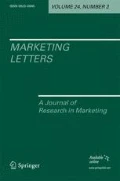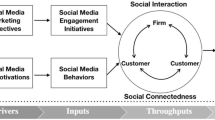Abstract
Previous research on social media marketing assumes that the more followers or “likes” an individual or company has on social media, the better. The current research is the first that challenges this assumption by showing that people make inferences about the credibility of social media accounts based on the number of likes a post receives relative to the size of its likely audience. The findings indicate that high as well as low likes-to-followers ratios negatively influence the perceived credibility of the account and, as such, dampen social media marketing effectiveness. The addition of hashtags is identified as a way to guard against the negative impact of high likes-to-followers ratios. Managers, (aspiring) influencers, and people in general involved in (personal) branding on social media can use the present findings to maximize the effectiveness of their social media marketing strategy.


Similar content being viewed by others
Notes
A pretest (N = 28, 57.1% male; mean age 20.6, SD = 0.84) confirmed that users pay attention to the likes-to-followers ratio and number of hashtags. After showing participants a fictitious Instagram account of Peter with 228 followers, 1191 likes on a post, and three hashtags, they were asked how they would describe “Peter”. Example responses were (italics added for emphasis): “As he has excessive likes compared to the followers he has, thinking about Peter I see an insecure person.” And “Peter is an account with approximately the same number of followers and followed. However, it is shocking that his picture has around 1000 likes. This suggests he paid or downloaded an app to get more likes, which makes him a little bit of a “loser”... Also, he only has three hashtags, so it will be nearly impossible to get all the likes for a normal/traditional picture of clouds and only three hashtags.”
Possible structural relationships that are not central to, and hence not tested in, the current research are depicted with light gray dashed lines.
Controlling for social media expertise by including it as a covariate rendered the same results (moderateI vs. low [.10, .66], moderateII vs. low [.05, .56]).
References
Baek, T. H., Kim, J., & Yu, J. H. (2010). The differential roles of brand credibility and brand prestige in consumer brand choice. Psychology & Marketing, 27(7), 662–678.
Cialdini, R. B. (1987). Influence: the psychology of persuasion. Harper Collins.
De Cristofaro, E., Friedman, A., Jourjon, G., Kaafar, M. A., & Shafiq, M.Z. (2014). Paying for likes? Understanding Facebook like fraud using honeypots. Proceedings of the 2014 Conference on Internet Measurement, 129–136.
De Vries, E. L. E., & Duque, L. C. (2018). Small but sincere: how firm size and gratitude determine the effectiveness of cause marketing campaigns. Journal of Retailing, 94(4), 352–363.
De Vries, L., Gensler, S., & Leeflang, P. S. H. (2012). Popularity of brand posts on brand fan pages: an investigation of the effects of social media marketing. Journal of Interactive Marketing, 26(2), 83–91.
Ehrhardt, J. (2017). Mirror, mirror on the wall, who has the best engagement of them all? – like follower ratio explained. Influences Db. https://blog.influencerdb.com/engagement-like-follower-ratio-explained/. Accessed 3 Sept 2018
Erdem, T., & Swait, J. (2004). Brand credibility, brand consideration, and choice. Journal of Consumer Research, 31(1), 191–198.
Erdem, T., Swait, J., & Louviere, J. (2002). The impact of brand credibility on consumer price sensitivity. International Journal of Research in Marketing, 19(1), 1–19.
Erkan, I. (2015). Electronic word of mouth on Instagram: customers’ engagements with brands in different sectors. Journal of Management, Accounting and Economics, 2(12), 1435–1444.
Geller, M. (2018). Unilever takes stand against digital media’s fake followers. Reuters.
Hayes, A. F. (2018). Introduction to mediation, moderation, and conditional process analysis: a regression-based approach. New York: The Guilford Press.
Hosie, R. (2017) Six easy ways to get more likes on Instagram. The Independent. http://www.independent.co.uk/life-style/instagram-how-get-more-likes-six-ways-tips-followers-emily-henderson-flowers-be-yourself-a7708086.html. Accessed 3 Sept 2018
Kirmani, A. (1990). The effect of perceived advertising costs on brand perceptions. Journal of Consumer Research, 17(2), 160–171.
Kirmani, A., & Wright, P. (1989). Money talks: perceived advertising expense and expected product quality. Journal of Consumer Research, 16(3), 344–353.
Mediakix (2017). Instagram influencer marketing is now a $1 billion industry. http://mediakix.com/2017/03/instagram-influencer-marketing-industry-size-how-big/#gs.7wzq2Sg. Accessed 3 Sept 2018
Mention (2018). Instagram engagement report. https://mention.com/en/. Accessed 3 Sept 2018
Molloy, M. (2017). How to get more likes on your Instagram photos. http://www.telegraph.co.uk/technology/0/get-likes-instagram/. Accessed 3 Sept 2018
Morales, E. (2017). How to measure what an Instagram post is worth. https://medium.com/the-mission/how-to-measure-what-an-instagram-post-is-worth-ffb38e91a9dd. Accessed 3 Sept 2018
Olsen, R., & Williams, R. (2017). Instagram: self-esteem booster or killer? http://gcml.org/instagram-self-esteem-booster-killer/. Accessed 3 Sept 2018
Osman, M. (2017). Here’s why you should never buy Instagram. Sprout social. https://sproutsocial.com/insights/buy-instagram-likes/.
Sheldon, P., & Bryant, K. (2016). Instagram: motives for its use and relationship to narcissism and contextual age. Computers in Human Behavior, 58, 89–97.
Statista (2017). Instagram: active users 2017. https://www.statista.com/statistics/253577/number-of-monthly-active-instagram-users/. Accessed 3 Sept 2018
Sweeney, J., & Swait, J. (2008). The effects of brand credibility on customer loyalty. Journal of Retailing and Consumer Services, 15(3), 179–193.
Funding
This work was supported by the Spanish Ministry of Economics (grant number ECO2017-87369-P).
Author information
Authors and Affiliations
Corresponding author
Additional information
Publisher’s note
Springer Nature remains neutral with regard to jurisdictional claims in published maps and institutional affiliations.
Appendix
Appendix
Rights and permissions
About this article
Cite this article
De Vries, E.L.E. When more likes is not better: the consequences of high and low likes-to-followers ratios for perceived account credibility and social media marketing effectiveness. Mark Lett 30, 275–291 (2019). https://doi.org/10.1007/s11002-019-09496-6
Published:
Issue Date:
DOI: https://doi.org/10.1007/s11002-019-09496-6









